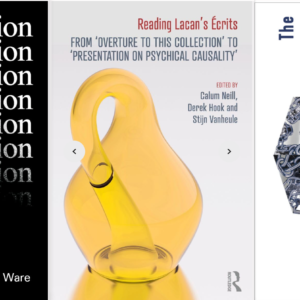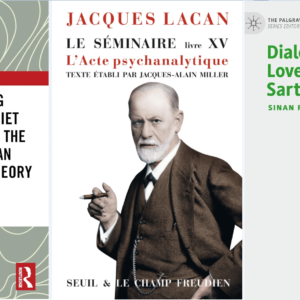News – December 2020
Want to receive this news via email each month? Sign up here.
20% off and free global shipping on all Routledge titles for LacanOnline.com readers. Use this link and code S031 at the checkout.
Two new books on the subject of psychoanalysis and AI have been newly announced for publication in early 2021. First is the latest in the Palgrave Lacan Series, Isabel Millar’s The Psychoanalysis of Artificial Intelligence. Due for release in April, it examines the crucial role of psychoanalysis in understanding what AI means for us as speaking, sexed subjects. Positing the figure of the sexbot as existing on the boundary between psychoanalysis and AI, Millar considers the question of enjoyment as a neglected factor in the philosophy and critical theory of AI. Second is Luca M. Possati’s The Algorithmic Unconscious: How Psychoanalysis Helps in Understanding AI. A wide-ranging study of psychoanalytic contributions to the topic, chapter 2 explores Lacanian concepts in particular, through Bruno Latour’s actor-network theory. Later in the book Possati argues that “the unconscious roots of AI lie in a form of projective identification, i.e., an emotional and imaginative exchange between humans and machines.” It will be released by Routledge in February.
Released at the end of last year was a collection from Thomas Svolos compiling his Miami seminars on the late Lacan. The Aims of Analysis brings together presentations given in October 2019 for Lacanian Compass, a group of the New Lacanian School in the US, and is published by Midden Press, the publishing house of Lacanian Compass. The focus of this short compilation is the nature and aims of interpretation, considering the clinical experience of psychoanalysis from both sides of the couch.
A translation of Marie Couvert’s The Baby and the Drive on Lacanian work with newborns and infants has been announced for publication in April. It is the latest release from the Centre for Freudian Analysis and Research Library. Couvert argues that the drive is the crucial factor in the life of the young child, and looks in depth at four drive ‘fields’ activated in the first year – orality, specularity, invocation, and touch. She elaborates clinical tools for the identification of, and intervention on, difficulties that may arise in these areas, as part of a new reading of drive theory. Couvert is a psychoanalyst and clinical psychologist practicing in Belgium and runs the graduate Seminar on Infants and Babies at the University of Louvain.
Darian Leader’s latest, Jouissance: Sexuality, Suffering and Satisfaction, will be released by Polity in June. It presents a critique of the use of the term ‘jouissance’ in psychoanalysis which – while often taken to designate a fusion of sexuality, suffering and satisfaction – “has fallen into a purely descriptive use that closes down more questions than it opens up.” Among areas considered are the relations of pleasure to pain, autoerotism, the links of satisfaction to arousal, the effects of repression, and the place of the body in psychoanalytic theory.
Turning to journals, various Lacanians contribute to the latest issue of the Contours Journal, ‘In a Time of Plagues’, which looks at the impact of the COVID pandemic from an analytic perspective. Under the guest editorship of Hilda Fernandez-Alvarez and Ted Byrne, this collection of 15 essays – written during the first wave of the pandemic and taking on renewed significance now that many parts of the world are experiencing a second or third wave – present responses to the pandemic from the perspectives of clinical practice, culture, and politics. It is available free online here.
The latest edition of Psychoanalytical Notebooks from the London Society of the NLS is now out. Issue number 36 focuses on ‘Formation of the Analyst’, considering questions of how one becomes a psychoanalyst in the Lacanian orientation. The contributors offer thoughts on analysis, supervision, and cartels, treated as the three pillars of analytic training. Questions considered include: why is a personal experience of a psychoanalysis necessary? What happens after the end of analysis? and Why is supervision necessary? Get it on Kindle immediately or via paperback on Amazon.
Volume 5, Issue 4 of LCExpress, the journal of Lacanian Compass in the US, was also released last month with a piece by Laurent Dupont of the ECP and WAP entitled ‘From Coding to the Letter: The Journey of the Dream in One Analysis’. Previous editions of LCExpress are also available via the link above.
Among events coming up in the next month, Lacanian Compass will be continuing its public video seminars for 2021, running on the second Sunday of each month. The year begins with Gustavo Dessal on Sunday 10th January offering a seminar as part of the group’s series Towards Clinical Study Days 14 – ‘Premonition of the Real: Notes on Freudian and Lacanian Theory about Anxiety’. Full details of all events are here.
The Freud Museum London will host an online talk on Wittgenstein, Lacan, and Astonishment on Weds 13th January, with Maria Balaska in conversation with Dany Nobus. A dialogue between Wittgenstein and Lacan, Balaska will argue, can teach us a lot about the experience of being astonished, given both thinkers’ interest in the dissatisfaction with meaning we feel when we attempt to articulate such experiences through language. Both Wittgenstein and Lacan offer us an opportunity to acknowledge our own involvement in meaning, and to creatively participate in it. Tickets are on a pay-what-you-can basis, with a suggested donation of £10. Recording access is offered for 14 days following the event. Sign up via the link above.
The Centre for Freudian Analysis and Research has announced its timetable of public seminars for the Spring Term, all of which will be held on Zoom. Starting on Saturday 16th January with a roundtable on ‘Symptoms after Analysis’, the programme will run up to Saturday 27th March and feature talks on the ‘Theory and Practice of the Pass’ (Genevieve Morel), ‘Cryptic Sexualities’ (Darian Leader), and ‘Lacan with Antigone: On Tragedy and Desire in the Ethics of Psychoanalysis’ (Dany Nobus). A Short Course on Acting Out and the Passage to the Act will also run in parallel, across four seminars starting 23rd January.
The NLS’s Dublin Day on The Pass and the Formation of the Psychoanalyst will take place on 16th January, via Zoom. Click the link above for full programme information. Speakers will discuss the practice, supervision, and guarantee of psychoanalysis, with short presentations from a number of contributors across the day. Dossia Avdelidi, the latest Analyst of the School to be appointed by the NLS, will also give a Pass testimony. A link to register is here.
Initiative Vienna of the NLS in Austria will provide another opportunity to hear Florencia F.C. Shanahan’s Pass Testimony on Bodily Effects and Hysteria on 29th January. This will then be followed by a Study Day on 30th. Sign up for the Zoom here.
Initiative Amsterdam, the NLS group in the Netherlands, will host Rik Loose and Mariela Vitto on Saturday 30th January for a webinar on Angst. Sign up for the Zoom link here.
Looking back to past events, English-language recordings of various events in 2020 from around the Lacanian world have recently been added to Radio Lacan. Among them: Gerado Areneas’ lecture for Lacanian Compass in August 2020, ‘All My Reals’, exploring the concept of the real in psychoanalysis; Lacanian readings of Freud’s The Ego and the Id from an Irish Society of the NLS event in June 2020; and Alexandre Stevens’ talk at the Knottings Seminar of the NLS on ‘Interpretation: From the Meaning that Escapes to the Cause’, from January 2020.
Finally, the sad news was announced at the end of 2020 of the death of the great Egyptian analyst Moustapha Safouan. An early attendee of Lacan’s Seminar, being present from the mid-1950s, Safouan was a giant of the Lacanian world. Known to many English-speaking readers for his Jacques Lacan and the Question of Psychoanalytic Training, Four Lessons of Psychoanalysis and the valuable collection of his own Seminars, his French-language publications were more prolific still and included titles such as Études sur l’Oedipe and Lacaniana, the latter being the two-volume summaries of Lacan’s Seminar which he edited. Safouan also dedicated himself to the translation of Freud’s Standard Edition into Arabic – beginning in the 1950s, at the same time as Stratchey was translating it into English. His later works offered contributions to the politics and history of Arab democracy. His Why are the Arabs not Free? The Politics of Writing appeared in 2007 in English and made the argument that a division between written and spoken Arabic (diglossia) has hindered the development of democracy in the Arab world. Ahram Online has a good obituary here. An extensive interview with Safouan, by Colin MacCabe, is available here.
Got news? Get in touch.




Leave a Reply